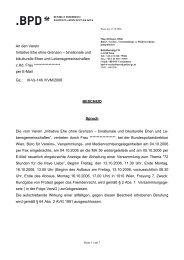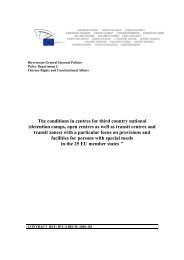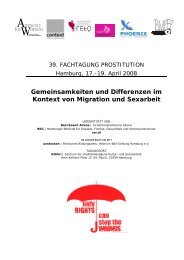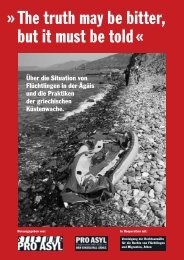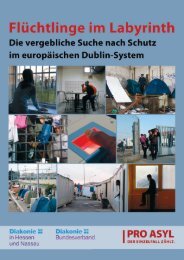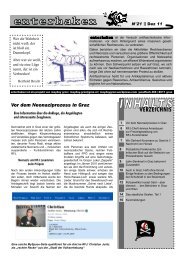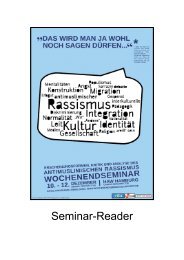Turin's CIE - International University College of Turin
Turin's CIE - International University College of Turin
Turin's CIE - International University College of Turin
Create successful ePaper yourself
Turn your PDF publications into a flip-book with our unique Google optimized e-Paper software.
“Your repatriation does not depend on you, but on your embassy [or] consulate. It depends<br />
on the fact that it recognises you as its own citizen. If you give your true personal details it<br />
is easier to be quickly repatriated but everything depends on your embassy. It has to give<br />
its authorisation for your repatriation, this means it has to check and identify you as its<br />
own citizen. But this is not easy because some people are not registered at all, for example<br />
those who come from the countryside” (Interview 28).<br />
Our interviews with pr<strong>of</strong>essionals and volunteers at <strong>Turin</strong>’s <strong>CIE</strong> revealed a systematic lack <strong>of</strong><br />
cooperation from several embassies and consulates. On the one hand, some consulates seem to<br />
accept their involvement in the identification procedure but nevertheless it was alleged that<br />
they still tend to delay the recognition <strong>of</strong> their citizens as much as possible. For others, there can<br />
be genuine practical difficulties hampering the identification process, as highlighted by the<br />
abovementioned interview (Interview 28). On the other hand, we received allegations that some<br />
consulates and embassies completely refuse any kind <strong>of</strong> cooperation with Italian authorities,<br />
albeit not in an explicit manner. The reasons for such a choice are usually <strong>of</strong> a political nature:<br />
“Also, there are particular cases. For example, in Modena’s <strong>CIE</strong> I was told: “we do not host<br />
Chinese people because their embassy does not cooperate, if it does not help us identifying<br />
them, we cannot repatriate them”” (Interview 28);<br />
“If Italy allocates money for inspections at sea, patrol boats, etc. the country collaborates,<br />
but if you do not give anything in return the embassies do not cooperate. Moldova and<br />
Ukraine, for example, work slowly” (Interview 4).<br />
The situation appears to be particularly frustrating for detainees who have been taken to <strong>CIE</strong><br />
after having served a prison sentence 136 . Undeniably, from the detainees’ perspectives there is a<br />
lack <strong>of</strong> efficiency and insufficient cooperation between their consulates and embassies and the<br />
Italian authorities who manage criminal and administrative detention:<br />
“Some consulates do not send anyone to identify their citizens, neither in jail nor inside <strong>CIE</strong>.<br />
They do not send any <strong>of</strong>ficials, documents, certificates or fingerprints. For example, the<br />
Egyptian consulate- I don’t know nowadays, but in the past they never went to jail or <strong>CIE</strong><br />
to identify migrants who reported to be Egyptian nationals. So, in some cases these<br />
migrants remained in jail for years and all that time nobody went there to identify them<br />
[...]. But in order to be repatriated they must be identified, so they are detained inside <strong>CIE</strong><br />
up to eighteen months only for the purpose <strong>of</strong> identification. And I really do not understand<br />
the reason why their own country <strong>of</strong> origin does not help them to get out <strong>of</strong> it, to get out <strong>of</strong><br />
<strong>CIE</strong>. Detainees themselves suffer very much for this reason because they usually have very<br />
good relationships with their consulates and they do not understand why those who are<br />
supposed to help and protect them do not do it” (Interview 1).<br />
Moreover, Article 15(4) <strong>of</strong> EU Directive 2008/115/EC provides that a detainee should be<br />
released from <strong>CIE</strong> when it becomes evident that for some reason the return decision issued<br />
against him cannot be enforced. Thus, if it becomes apparent that a detainee will never be<br />
identified by a given country because that country simply does not process identification<br />
requests, then the detainee in question should be released because the initial reason justifying<br />
their detention no longer exists. From our interviews we discovered that while this sometimes<br />
occurs, it is only after a considerable period <strong>of</strong> time has elapsed:<br />
“The rule says that you should not detain a person if you see that there is no chance that<br />
you can identify him or deport him. You can release him after it is not possible to obtain his<br />
136 See Part B. Conditions <strong>of</strong> Detention, Chapter III. Prison and <strong>CIE</strong>.<br />
73 | P a g e




